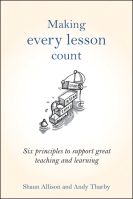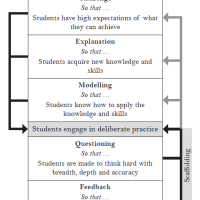 The first 15 minute forum of the new year was led tonight by Andy Tharby. Andy was discussing strategies that can be used to develop memory.
The first 15 minute forum of the new year was led tonight by Andy Tharby. Andy was discussing strategies that can be used to develop memory.
Why knowledge is important
1. The more automatic and effortless their knowledge is, the easier it is to stretch and challenge students. A good analogy here is driving a car. The more you practise driving a car, the more effortless it becomes – the less you think about. This allows you to do more whilst driving e.g. plan your lessons for the day ahead!
How does this apply to school? Well, if students know their multiplication tables, they can solve more complex problems much quicker. Similarly in English, if students have a good grasp of spelling, punctuation and grammar, writing becomes much easier. So knowledge is key as it’s the bedrock of everything we do.
2. Critical thinking requires background knowledge. If you are going to think critically about something, or evaluate it or analyse something, you need the background knowledge.
- Testing is a more effective strategy than just reviewing notes.
- Using your memory, improves your memory.
- When a memory is harder to retrieve, the effect is even stronger. So rather than just asking students what they have remembered from a lesson, at the end of a lesson, ask them at the end of a lesson and then again 2 weeks later.
Robert Bjork explains:
- Retrieval alters the memory system.
- The more you retrieve it, the more accessible it is.
- Testing is all too often used as an assessment tool, however it is a really important memory tool.
- Testing has become a bad word in education – this is unfortunate.
- Regular low stakes quizzes – Introduce quizzes to your lesson that test knowledge from last lesson, last week and last month. Low stakes, because the score doesn’t need to be recorded or even shared – it’s the process that’s important. What you can do though, is a quick survey of the questions that the students struggled with – to inform your future planning. Legendary DHS science teacher, Pam McCulloch used this strategy most lessons – with astonishing results. Read more here.
- Make your starter, the plenary of your last lesson – So at the start of your lesson, get students to recall the key learning points from the previous lesson. All too often we make the assumption that if they remember something at the end of the lesson, they have learnt it. This is only the case if they can recall it 6 weeks, 6 months or a year later (for more teaching myths, look here!)
- Elaboration – Link what they have learnt to what they already know e.g. how does that link to what we were learning last term?
- Paired starters – use students to quiz each other in pairs. So, A tells B everything they can remember from last lesson. B then adds to this for another minute, with things that A missed out. Pick some pairs to feed back.
- Card sort activities – as seen on twitter! A history teacher wanted to develop their student’s understanding of 10 decades of history. So, they had 100 cards with images on them that linked to the 10 decades, that they had to sort into the decades. Nothing new here – but they did this every lesson, for 6 weeks – a great example of continual retrieval being used to enhance memory.
- Questioning – quick fire recap questions – A very common strategy – just keep asking lots of questions that require retrieval. But do it like this – Ask the question, then pause, then say the name of the student you want to answer it e.g. “What’s the name of a hormone that controls glucose levels…..[Pause]……Amanda?” This small change makes a big difference – everyone has to do the memory retrieval, as you may call on any one of them for the answer.
Further Reading
Andy Tharby – Memory Platforms
Harry Fletcher-Wood – What I learned from learning the periodic table…..
Joe Kirby – Why don’t students remember what they’ve learned?











Reblogged this on Creative T&L and commented:
I have a Year 9 group who struggle to retain and recall previous knowledge. This post was just what I needed to reinvigorate some ways to support them.
Pingback: Straddling in Science | Class Teaching
Pingback: Even Better If…I add quizzes | #TeachGeog
Pingback: 15 Minute Forums – Autumn 2014 | Class Teaching
Pingback: My rubik’s cube and what it means for how I will teach next term | a different drum
Pingback: Reflections on the first half term (and a bit more) of my fifteenth year – like starting all over again | a view through different eyes